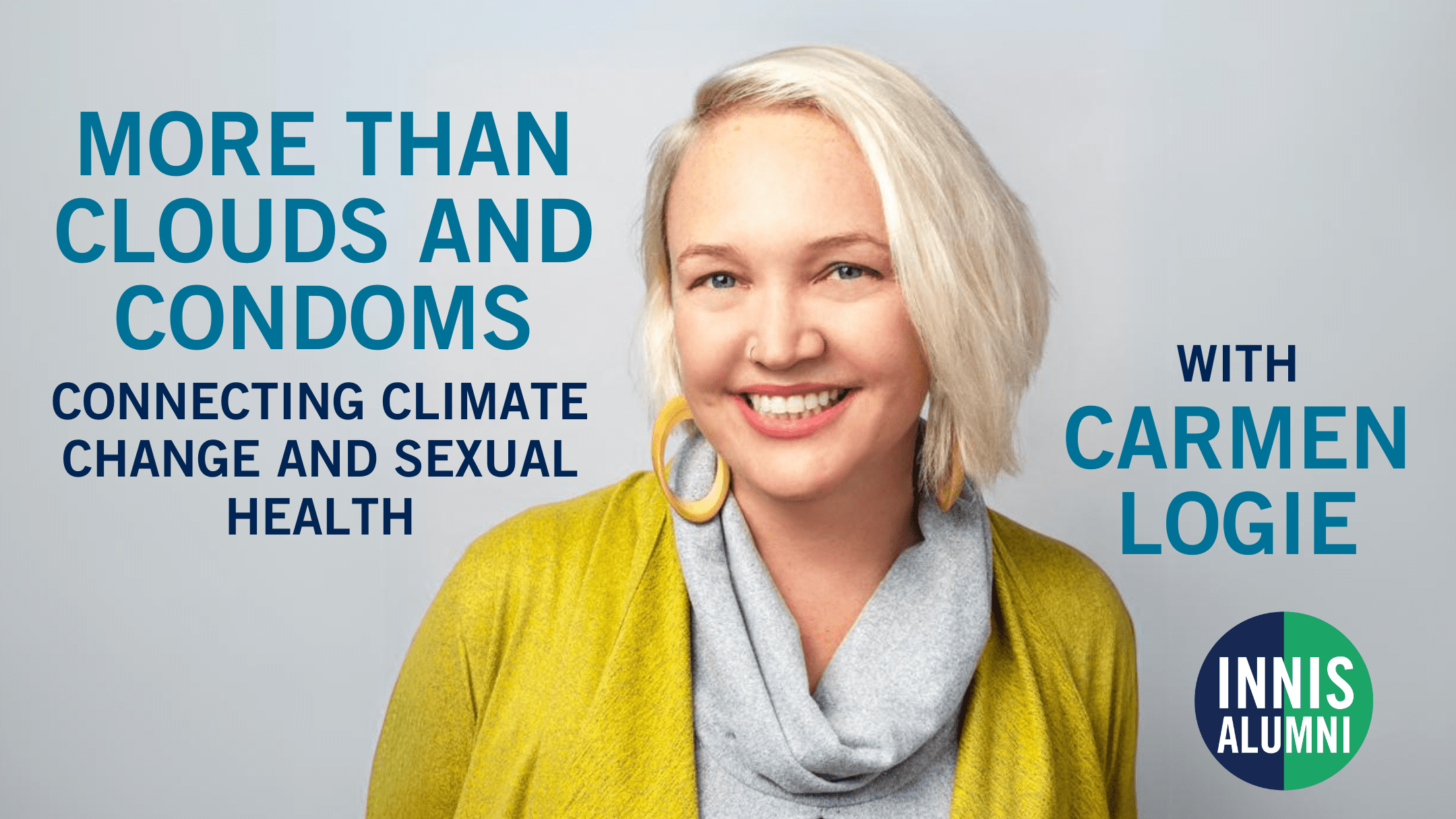Now on YouTube: Carmen Logie highlights the connection between climate change and sexual health
Categories: Carmen Logie, Faculty, ResearchOn March 20, Professor Carmen Logie delivered the 2024 Innis Alumni Lecture, “More than Clouds and Condoms: Connecting Climate Change and Sexual Health” at Innis Town Hall.
During her talk, Logie, who joined the Factor-Inwentash Faculty of Social Work in 2013, shared insight from her international research that has uncovered strong links between climate change and mental health.
In addition to her role at FIFSW, Logie is Canada Research Chair in Global Health Equity and Social Justice with Marginalized Populations and an Adjunct Professor at the United Nations University Institute for Water, Environment & Health.
Logie started her lecture by listing the many people whose lives have been impacted by a lack of safe water, access to food and sanitation — all of which are consequences of climate change.
Citing other global studies, Logie shared that worldwide:
- 2 billion people are affected by water insecurity,
- 2 billion people experience hunger,
- 1 billion adolescent girls and women suffer from undernutrition,
- 276 million people are affected by acute hunger, and
- 673 million people have no access to toilets.
“Our team has been looking at the lived experiences of these events among young people in climate-affected communities in different contexts,” said Logie. Her research has examined the experiences of refugee youth living in urban informal settlements in Kampala and in Bidi Bidi refugee settlement in Uganda, Africa’s largest refugee-hosting nation. She has also explored how extreme weather events impacts youth in diverse climate-affected regions in Kenya and how water insecurity shapes risks of depression among lesbian, gay, bisexual, transgender and queer persons in Bangkok, Thailand and Mumbai, India. In addition, Logie has new research examining adolescent experiences of the forest fires in Canada’s Northwest Territories.
As Logie shares in her lecture, the impacts of climate change, particularly for girls and women, have been vast. In Uganda, for example, water insecurity due to drought has meant that girls and women have had to walk long distances to fetch water, with some travelling at night to avoid long lineups, which has increased the risk of gender-based violence. Extreme heat, which has led to people sleeping outside, brought about similar risks. A lack of water has also affected access to safe sanitation and food security, increasing transactional sex to meet basic needs. Meanwhile, drought has disrupted education, especially for girls, and access to health care, including HIV treatment and prevention.
These are just some of the examples Logie shared in her talk on research funded by the Canadian Institutes of Health Research (CIHR), Social Sciences and Humanities Research Council of Canada (SSHRC), and the International Research Development Centre (IDRC).
For those who missed it (or those who may want to watch it again!), Logie’s full lecture is now available online and can be viewed above.

Are you a member of the media interested in speaking to Logie for a story? Contact FIFSW’s Senior Communications Strategist Dale Duncan at dale.duncan@utoronto.ca
Recent studies led or co-authored by Dr. Carmen Logie referenced in the lecture
Logie CH, Okumu M, Berry I, Loutet M, Hakiza R, Kibuuka Musoke D, Mwima S, Kiera UM, MacNamee C, Kyambadde P. Social contextual factors associated with lifetime HIV testing among the Tushirikiane urban refugee youth cohort in Kampala, Uganda: Cross-sectional findings. Int J STD AIDS. 2022 Mar;33(4):374-384. doi: 10.1177/09564624211069236. Epub 2022 Feb 5. PMID: 35125037; PMCID: PMC8958564.
Logie, C., Okumu, M., Tailor, L., Taing, L., Dorea, C., Mbuagbaw, L., Hakiza, R., Kibuuka-Musoke, D., Katisi, B., Nakitende, A., Kyambadde, P., MacKenzie, F., Admassu, Z. (2024). Water and food insecurity and linkages with physical and sexual intimate partner violence among urban refugee youth in Kampala, Uganda: cross-sectional survey findings. Journal of Water, Sanitation, and Hygiene for Development. https://doi.org/10.2166/washdev.2024.298
Logie, C., Okumu, M., Admassu, Z., Perez-Brumer, A., Ahmed, R., Lahai Luna, M., MacKenzie, F., Kortenaar, J.L., Berry, I., Hakiza, R., Katisi, B., Musoke, D., Nakitende, A., Batte, S., Kyambadde, P., Taing, L., Giordana, G., Mbuagbaw, L. (2024). HIV vulnerabilities associated with water and food insecurity among urban refugee youth in Kampala, Uganda: Implications for resource insecurity-informed HIV prevention. AIDS & Behavior, 28(2), 507-523.
Logie, C.H., Okumu, M., Latif, M., Musoke, D., Odong, S., Mwima, S., and Kyambadde, P. (2021). Exploring resource scarcity and contextual influences on wellbeing among young refugees in Bidi Bidi refugee settlement, Uganda. Conflict & Health, 15(3).
Logie, C.H.; Lys, C.; Sokolovic, N.; Malama, K.; Mackay, K.I.; McNamee, C. ; Lad, A.; & Kanbari, A. (2023). Examining Pathways from Food Insecurity to Safer Sex Efficacy Among Northern and Indigenous Adolescents in the Northwest Territories, Canada. International Journal of Behavioral Medicine. EARLY ACCESS July 2023. DOI: 10.1007/s12529-023-10195-w
Logie, C.H.; Newman, P.A.; Admassu, Z.; Mackenzie, F.; Chakrapani, V.; Tepjan, S.; Shunmugam, M.; & Akkakanjanasupar, P. (2024). Associations between water insecurity and mental health outcomes among lesbian, gay, bisexual, transgender and queer persons in Bangkok, Thailand and Mumbai, India: Cross-sectional survey findings. Cambridge Prisms-Global Mental Health. DOI: 10.1017/gmh.2024.27